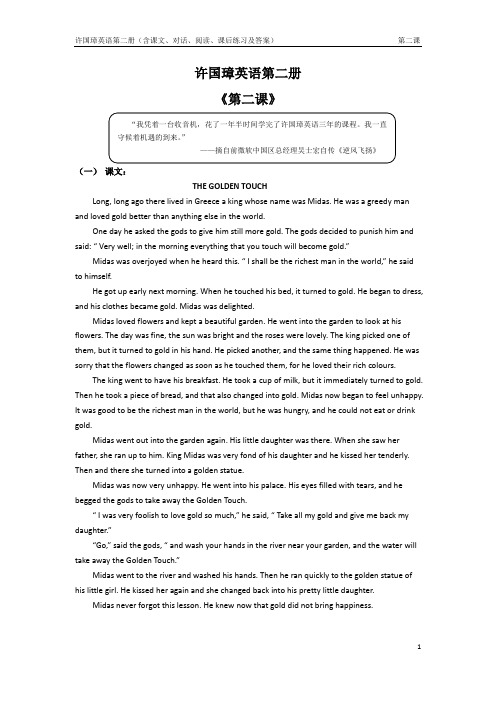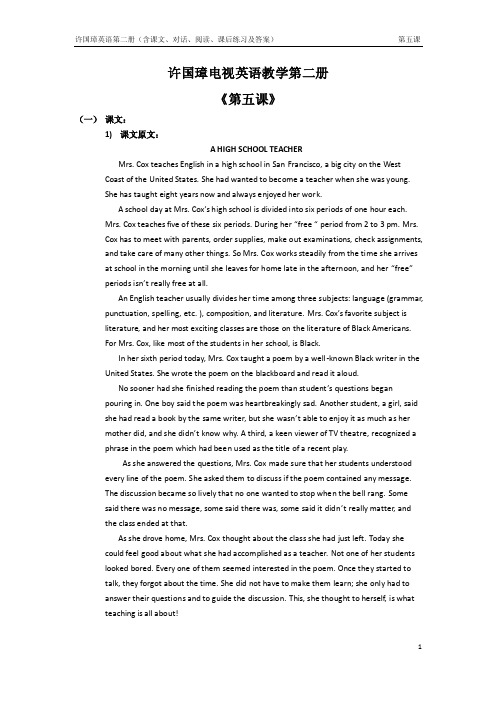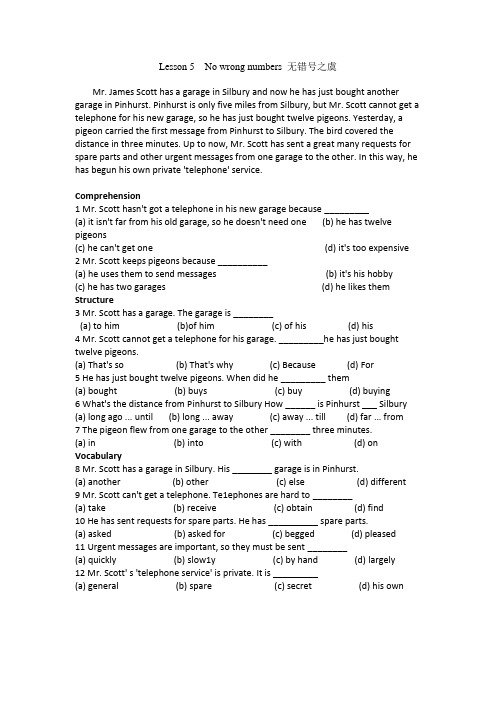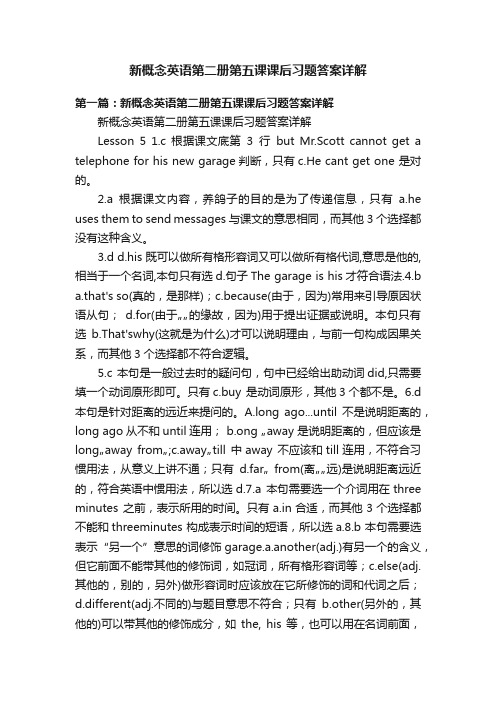许国璋英语第二册第五课(含课文、对话、阅读、课后练习及答案)
许国璋英语第二册第二课课文、对话、练习,前微软中国区总经理吴士宏学习英文的教 材

许国璋英语第二册《第二课》(一)课文:THE GOLDEN TOUCHLong, long ago there lived in Greece a king whose name was Midas. He was a greedy man and loved gold better than anything else in the world.One day he asked the gods to give him still more gold. The gods decided to punish him and said: “ Very well; in the morning everything that you touch will become gold.”Midas was overjoyed when he heard this. “ I shall be the richest man in the world,” he said to himself.He got up early next morning. When he touched his bed, it turned to gold. He began to dress, and his clothes became gold. Midas was delighted.Midas loved flowers and kept a beautiful garden. He went into the garden to look at his flowers. The day was fine, the sun was bright and the roses were lovely. The king picked one of them, but it turned to gold in his hand. He picked another, and the same thing happened. He was sorry that the flowers changed as soon as he touched them, for he loved their rich colours.The king went to have his breakfast. He took a cup of milk, but it immediately turned to gold. Then he took a piece of bread, and that also changed into gold. Midas now began to feel unhappy. It was good to be the richest man in the world, but he was hungry, and he could not eat or drink gold.Midas went out into the garden again. His little daughter was there. When she saw her father, she ran up to him. King Midas was very fond of his daughter and he kissed her tenderly. Then and there she turned into a golden statue.Midas was now very unhappy. He went into his palace. His eyes filled with tears, and he begged the gods to take away the Golden Touch.“ I was very foolish to love gold so much,” he said, “ Take all my gold and give me back my daughter.”“Go,” said the gods, “ and wash your hands in the river near your garden, and the water will take away the Golden Touch.”Midas went to the river and washed his hands. Then he ran quickly to the golden statue of his little girl. He kissed her again and she changed back into his pretty little daughter.Midas never forgot this lesson. He knew now that gold did not bring happiness.(二)课文译文点金术很久很久以前,在希腊居住着一位名叫迈达斯的国王。
新概念英语第二册课文+练习Lesson5

Lesson 5 No wrong numbers 无错号之虞Mr. James Scott has a garage in Silbury and now he has just bought another garage in Pinhurst。
Pinhurst is only five miles from Silbury, but Mr。
Scott cannot get a telephone for his new garage, so he has just bought twelve pigeons. Yesterday, a pigeon carried the first message from Pinhurst to Silbury. The bird covered the distance in three minutes。
Up to now, Mr. Scott has sent a great many requests for spare parts and other urgent messages from one garage to the other. In this way, he has begun his own private 'telephone' service.Comprehension1 Mr。
Scott hasn’t got a telephone in his new garage because _________(a)it isn’t far from his old garage, so he doesn’t need one (b) he has twelve pigeons(c)he can’t get on e (d)it’s too expensive2 Mr。
Scott keeps pigeons because __________(a) he uses them to send messages (b) it's his hobby(c) he has two garages (d) he likes themStructure3 Mr. Scott has a garage。
许国璋英语第二册第五课(含课文、对话、阅读、课后练习及答案)

许国璋电视英语教学第二册《第五课》(一)课文:1)课文原文:A HIGH SCHOOL TEACHERMrs. Cox teaches English in a high school in San Francisco, a big city on the West Coast of the United States. She had wanted to become a teacher when she was young.She has taught eight years now and always enjoyed her work.A school day at Mrs. Cox’s high school is divided into six periods of one hour each.Mrs. Cox teaches five of these six periods. During her “free “ period from 2 to 3 pm. Mrs.Cox has to meet with parents, order supplies, make out examinations, check assignments, and take care of many other things. So Mrs. Cox works steadily from the time she arrivesat school in the morning until she leaves for home late in the afternoon, and her “free”periods isn’t really free at all.An English teacher usually divides her time among three subjects: language (grammar, punctuation, spelling, etc. ), composition, and literature. Mrs. Cox’s favorite subject isliterature, and her most exciting classes are those on the literature of Black Americans.For Mrs. Cox, like most of the students in her school, is Black.In her sixth period today, Mrs. Cox taught a poem by a well-known Black writer in the United States. She wrote the poem on the blackboard and read it aloud.No sooner had she finished reading the poem than student’s questions began pouring in. One boy said the poem was heartbreakingly sad. Another student, a girl, saidshe had read a book by the same writer, but she wasn’t able to enjoy it as much as hermother did, and she didn’t know why. A third, a keen viewer of TV theatre, recognized aphrase in the poem which had been used as the title of a recent play.As she answered the questions, Mrs. Cox made sure that her students understood every line of the poem. She asked them to discuss if the poem contained any message.The discussion became so lively that no one wanted to stop when the bell rang. Somesaid there was no message, some said there was, some said it didn’t really matter, andthe class ended at that.As she drove home, Mrs. Cox thought about the class she had just left. Today she could feel good about what she had accomplished as a teacher. Not one of her studentslooked bored. Every one of them seemed interested in the poem. Once they started totalk, they forgot about the time. She did not have to make them learn; she only had toanswer their questions and to guide the discussion. This, she thought to herself, is whatteaching is all about!2)原文译文:一位高中教师考克斯夫人在美国西海岸一座大城市旧金山的一所高中教英语。
大学英语第二册第5课课文及课后答案

大学英语第二册第5课课文及课后答案UNIT 5TEXT在一个年轻朋友的眼中,爱因斯坦是一位朴素、谦虚的普通人。
教授和溜溜球托马斯. 李. 巴基及约瑟夫.布兰克我父亲与阿尔伯特. 爱因斯坦是密友。
青年时上爱因斯坦家去拜访,我很害羞,爱因斯坦就说:“我给你看一样东西。
”他的话使我感到释然。
他走向他的书桌,转过身时拿着一个溜溜球。
他试着给我演示它如何运动,却不能让它沿绳子卷上去。
该轮到我时,我仅略施小技,并且向他指出他将绳子卷错了,玩具就失去了平衡。
爱因斯坦点着头,对我的技巧和知识留下了很深的印象。
后来,我买了一个新的溜溜球,寄给教授作为圣诞礼物,并收到了他的一首充满感谢的诗。
由少年而至成年,我从未失去对爱因斯坦独具人格的好奇心。
他是我所知的唯一的一个对自己对周围很淡泊的人。
他知道自己需要什么,仅需要:在作为人的能力范围内去了解宇宙的特性,它的逻辑及功能的易行性。
他知道有他智力所不能及的答案。
但这并不令他泄气。
他对自己所能做到的感到满足。
在我们长达23年的友情里,我从未见他表示过妒忌、虚荣心、痛苦、愤怒、憎恨或个人野心。
他不弄玄虚。
尽管他与世界上许多头面人物有过书信交往,他的信笺上却只有一个水印-W-代表伍尔沃斯连锁店。
他工作只需一支铅笔和一本便签薄。
物质财富对他来说并不意味着什么,我知道他身上从不带钱,因为他不需要它。
他恪守俭朴,节俭之甚,仅用安全剃刀和水来刮胡须。
当我向他建议用刮须膏时,他说:“刀和水能管用。
”他耸耸肩。
最后,我送他一管刮须膏。
第二天早晨他下楼吃早餐时,脸上洋溢着伟大新发现的喜悦。
“你知道刮须膏真管用,”他宣称,“感觉真好。
”尔后,他每天使用刮须膏,直到那一管用完为止。
然后他重又使用清水。
爱因斯坦是一个地地道道的理论家。
他对自己的思想和理念在实际上的应用毫无兴趣。
他的E=mc2可能是历史上最有名的方程式-然而爱因斯坦不愿到外面去看核反应堆产生原子能。
他的光电理论,他认为不甚重要的一系列方程式,为他赢得了诺贝尔奖,但他对他的理论如何用来生产电视机毫不关心。
新概念英语第二册课文+练习 Lesson 5

Lesson 5 No wrong numbers 无错号之虞Mr. James Scott has a garage in Silbury and now he has just bought another garage in Pinhurst. Pinhurst is only five miles from Silbury, but Mr. Scott cannot get a telephone for his new garage, so he has just bought twelve pigeons. Yesterday, a pigeon carried the first message from Pinhurst to Silbury. The bird covered the distance in three minutes. Up to now, Mr. Scott has sent a great many requests for spare parts and other urgent messages from one garage to the other. In this way, he has begun his own private 'telephone' service.Comprehension1 Mr. Scott hasn't got a telephone in his new garage because _________(a) it isn't far from his old garage, so he doesn't need one (b) he has twelve pigeons(c) he can't get one (d) it's too expensive2 Mr. Scott keeps pigeons because __________(a) he uses them to send messages (b) it's his hobby (c) he has two garages (d) he likes them Structure3 Mr. Scott has a garage. The garage is ________(a) to him (b)of him (c) of his (d) his4 Mr. Scott cannot get a telephone for his garage. _________he has just bought twelve pigeons.(a) That's so (b) That's why (c) Because (d) For5 He has just bought twelve pigeons. When did he _________ them(a) bought (b) buys (c) buy (d) buying6 What's the distance from Pinhurst to Silbury How ______ is Pinhurst ___ Silbury(a) long ago ... until (b) long ... away (c) away ... till (d) far ... from7 The pigeon flew from one garage to the other ________ three minutes.(a) in (b) into (c) with (d) on Vocabulary8 Mr. Scott has a garage in Silbury. His ________ garage is in Pinhurst.(a) another (b) other (c) else (d) different9 Mr. Scott can't get a telephone. Te1ephones are hard to ________(a) take (b) receive (c) obtain (d) find10 He has sent requests for spare parts. He has __________ spare parts.(a) asked (b) asked for (c) begged (d) pleased11 Urgent messages are important, so they must be sent ________(a) quickly (b) slow1y (c) by hand (d) largely12 Mr. Scott' s 'telephone service' is private. It is _________(a) general (b) spare (c) secret (d) his own。
新概念英语第二册第五课课文详解

新概念英语第二册第五课课文详解新概念英语二册第五课讲解一、生词和短语1、pigeon n. 鸽子It's not my pigeon. 这不是我的过错=None of my busness.2、message n. 信息information...不可数leave sb. a message:给...留便条I'll leave you a message.take a message for sb:替...捎口信Can I take a message for you?Can you take a message for me?3、cover v. 越过cover:覆盖cover+距离:越过cover the distancedistance n. 距离distant:(a)远距离的importance:(n.)重要important:(a.)重要的different:(a.) 不同的 difference:(n.)不同keep distance:保持距离4、request n. 要求,请求request for:对...有请求,有需求I have a request for the cake.request sb.to do sth...要求某人做..=ask sb.to do sth.require sb.to do sth.you are required/asked to do...5、service n. 业务,服务serve:(v.) 服务,接待service:(n.)服务,业务I am glad to be at your service. 我很乐意为您效劳.--Thank you.--You are welcome./Not at all./That's (all)right./(It's) My pleasure./That's ok.--Thank you for your listening.-No thanks.二、词汇辨析:1、other 能够做形容词,表示其他的,比如other people其他的人。
许国璋英语第二册第二单元(6至10课)练习

许国璋英语第二册第二单元(6至10课)练习许国璋英语第二册(含课文、对话、阅读、课后练习及答案)第二单元(6―10课)练习徐国章英语第二卷第2单元(6―10课)练习修订演习(ll6-10)“我凭着一台收音机,花了一年半时间学完了许国璋英语三年的课程。
我一直守候着机遇的到来。
”――摘自前微软中国区总经理吴士宏自传《逆风飞扬》1.fillintheblankswithcorrectletters:[e] 重磅线甜蜜[i]安装约会快乐稳定稳定的朋友对抗[D?]判断士兵粥建议形容词形容词2.fillintheblankswithsuitablewords:1)什么样的男人?赫瓦萨…。
成年男子可爱的,和蔼的,诚实的,热情的,高尚的,沉静的,慷慨大方的,了不起的,有趣的,勇敢的,骄傲的,自私的,愚蠢的,贪吝的等。
whatkindofmanwashe?hewasalovelyman./…阿金德曼。
/…anhonestman./…anenthusiasticma n./安诺布曼。
/…阿基特曼…阿根瑟曼。
/…aextraordinaryman./…不是一个真正的男人。
/…艾布拉夫曼。
/…阿普鲁德曼/…阿塞尔菲什曼/…愚蠢的人…同意。
2)howisnancy?sheis….更好、恢复、睡眠、良好、困倦、疲倦、情绪高涨、情绪低落、生气、生病、健康状况良好、健康状况不佳、快乐、悲伤等。
1[?] [t?]足够年轻的南方人[t?]观察家具世纪[i]敌人[?]市场市场桶愚蠢壮丽壮观科塔奇村舍村熔炉[?]法西斯主义机器处理团队表达绩效计划[?]徐国璋第2卷第2单元(第6-10课)练习(包括课文、对话、阅读、课后习题和答案)sheisbetter/recovered/asleep/well/sleepy/tired/inhighspirits/inlowspirits/angry/ill/ingoodhealth/inbadhealth/glad/sad/3)今天天气怎么样?那是…天睛,下雨,有风,冷,热,温和,干燥,美好,坏,可爱,好极了,阴湿,可怕,不太坏,还可以,特别晴朗等。
新概念英语第二册第五课课后习题答案详解

新概念英语第二册第五课课后习题答案详解第一篇:新概念英语第二册第五课课后习题答案详解新概念英语第二册第五课课后习题答案详解Lesson 5 1.c 根据课文底第3行but Mr.Scott cannot get a telephone for his new garage判断,只有c.He cant get one 是对的。
2.a根据课文内容,养鸽子的目的是为了传递信息,只有a.he uses them to send messages与课文的意思相同,而其他3个选择都没有这种含义。
3.d d.his 既可以做所有格形容词又可以做所有格代词,意思是他的,相当于一个名词,本句只有选d.句子The garage is his才符合语法.4.b a.that's so(真的,是那样);c.because(由于,因为)常用来引导原因状语从句;d.for(由于……的缘故,因为)用于提出证据或说明。
本句只有选b.That'swhy(这就是为什么)才可以说明理由,与前一句构成因果关系,而其他3个选择都不符合逻辑。
5.c 本句是一般过去时的疑问句,句中已经给出助动词did,只需要填一个动词原形即可。
只有c.buy 是动词原形,其他3个都不是。
6.d 本句是针对距离的远近来提问的。
A.long ago...until 不是说明距离的,long ago从不和until连用;b.ong …away 是说明距离的,但应该是long…away from…;c.away…till 中away 不应该和till连用,不符合习惯用法,从意义上讲不通;只有d.far… from(离……远)是说明距离远近的,符合英语中惯用法,所以选d.7.a 本句需要选一个介词用在three minutes 之前,表示所用的时间。
只有a.in合适,而其他3个选择都不能和threeminutes 构成表示时间的短语,所以选a.8.b 本句需要选表示“另一个”意思的词修饰garage.a.another(adj.)有另一个的含义,但它前面不能带其他的修饰词,如冠词,所有格形容词等;c.else(adj.其他的,别的,另外)做形容词时应该放在它所修饰的词和代词之后;d.different(adj.不同的)与题目意思不符合;只有b.other(另外的,其他的)可以带其他的修饰成分,如the, his等,也可以用在名词前面,所以选b.9.c 本句需要选出一个与前一句中的动词get 意思相同的词.a.take(拿去,携带)b.receive(收到),d.find(发现,找到)都不是get 的同义词.,只有c.obtain(获得),所以选c.10.b 本句需要选出与前一句的动词短语send requests for 的意思相同的词或短语.a.asked(问,打听);b.askedfor(请求),c.begged(乞讨),d.pleased(喜欢,使……高兴),只有b.有请求的意思,意思最接近,所以选b.11.a 本句主要想说明紧急信函应如何发出。
- 1、下载文档前请自行甄别文档内容的完整性,平台不提供额外的编辑、内容补充、找答案等附加服务。
- 2、"仅部分预览"的文档,不可在线预览部分如存在完整性等问题,可反馈申请退款(可完整预览的文档不适用该条件!)。
- 3、如文档侵犯您的权益,请联系客服反馈,我们会尽快为您处理(人工客服工作时间:9:00-18:30)。
许国璋电视英语教学第二册《第五课》(一)课文:1)课文原文:A HIGH SCHOOL TEACHERMrs. Cox teaches English in a high school in San Francisco, a big city on the West Coast of the United States. She had wanted to become a teacher when she was young.She has taught eight years now and always enjoyed her work.A school day at Mrs. Cox’s high school is divided into six periods of one hour each.Mrs. Cox teaches five of these six periods. During her “free “ period from 2 to 3 pm. Mrs.Cox has to meet with parents, order supplies, make out examinations, check assignments, and take care of many other things. So Mrs. Cox works steadily from the time she arrivesat school in the morning until she leaves for home late in the afternoon, and her “free”periods isn’t really free at all.An English teacher usually divides her time among three subjects: language (grammar, punctuation, spelling, etc. ), composition, and literature. Mrs. Cox’s favorite subject isliterature, and her most exciting classes are those on the literature of Black Americans.For Mrs. Cox, like most of the students in her school, is Black.In her sixth period today, Mrs. Cox taught a poem by a well-known Black writer in the United States. She wrote the poem on the blackboard and read it aloud.No sooner had she finished reading the poem than student’s questions began pouring in. One boy said the poem was heartbreakingly sad. Another student, a girl, saidshe had read a book by the same writer, but she wasn’t able to enjoy it as much as hermother did, and she didn’t know why. A third, a keen viewer of TV theatre, recognized aphrase in the poem which had been used as the title of a recent play.As she answered the questions, Mrs. Cox made sure that her students understood every line of the poem. She asked them to discuss if the poem contained any message.The discussion became so lively that no one wanted to stop when the bell rang. Somesaid there was no message, some said there was, some said it didn’t really matter, andthe class ended at that.As she drove home, Mrs. Cox thought about the class she had just left. Today she could feel good about what she had accomplished as a teacher. Not one of her studentslooked bored. Every one of them seemed interested in the poem. Once they started totalk, they forgot about the time. She did not have to make them learn; she only had toanswer their questions and to guide the discussion. This, she thought to herself, is whatteaching is all about!2)原文译文:一位高中教师考克斯夫人在美国西海岸一座大城市旧金山的一所高中教英语。
她年轻的时候就想当老师。
她已经教书八年了,而且一直喜欢她的工作。
考克斯夫人的高中一天分为六节课,每节一小时。
考克斯夫人教这六节课中的五节课。
从下午2点到3点。
考克斯太太要见学生家长,订购用品,设计考试题,检查作业,处理许多其他的事情。
因此,考克斯夫人从早上到达学校到下午晚些时候回家都很长,她的“免费”时间根本就不自由。
英语老师通常把时间分成三个科目:语言(语法、标点符号、拼写等)、作文和文学。
考克斯夫人最喜欢的科目是文学,最令她兴奋的课程是关于黑人文学的课程。
对考克斯夫人来说,和她学校的大多数学生一样,她是黑人。
在今天的第六节课上,考克斯教授了一位美国著名黑人作家的一首诗。
她把这首诗写在黑板上大声朗读。
她刚读完这首诗,学生们的问题就涌了上来。
一个男孩说这首诗令人心碎。
另一个学生,一个女孩,说她读过同一位作家的一本书,但她不能像她母亲那样享受这本书,她也不知道为什么。
第三位热衷于看电视戏剧,他认出了这首诗中的一个短语,这句话曾被用作最近一部戏剧的标题。
考克斯夫人在回答问题时,确保学生们能听懂这首诗的每一行。
她要求他们讨论这首诗是否包含任何信息。
讨论变得如此热烈,铃声一响,没人想停下来。
一些人说没有信息,有人说有,有人说这并不重要,而课程就这样结束了。
当她开车回家时,考克斯夫人想起了她刚离开的那堂课。
今天,她能对自己作为一名教师所取得的成就感到高兴。
她的学生中没有一个看上觉得课程无聊。
他们每个人似乎都对这首诗感兴趣。
他们一开始讨论,就忘了时间。
她不需要让他们学习,她只需要回答他们的问题并指导讨论。
她心想,这就是教学的意义所在!3)扩展词汇:1.Junior high school 初中2.A high school junior 初中生3.Senior high school 高中4.A high school senior 高中生5.Secondary school 中学(英国说法,11-19岁学生)6.Middle school 初中(不如high school 普遍)(二)DIALOGUE:(对话)1.教学视频对话:A PHONE CALL(The bell rings.)A: 4372811.B: Hello, is that Nick?A: Yes, speaking.B: Oh, hello. This is Kate. It's about our meeting with Mr. Jones.A: I think he's really going to help us a lot. Are you free on Saturday morning tomeet him?B: No, sorry. I'm going to see my bank manager.A: Oh, dear. What about Friday morning?B: Yes, Friday is fine. What time?A: Half past seven.B: Half past seven. Right. See you then. Bye.A:Bye.2.教学视频对话译文:打电话(电话铃响)A:4372811。
B:你好,是尼克吗?A:是的,我就是。
B:噢,你好,我是凯特。
是关于我们和琼斯先生会面的事。
A:我想他真的会对我们大有帮助的。
你星期六上午有空去见他吗?B:真抱歉,我没空。
我要去见我银行的经理。
A:噢,这样啊。
那星期五上午怎么样?B:好的,星期五可以。
几点呢?A:7点半吧。
B:7点半,好的。
那么到时候见了,再见。
A:再见。
3.原课本对话:GENERAL CLEANINGA.C omrades, let’s start cleaning.B.B ut where are the things? We need a broom, a dustpan and a mop.A.T hey are downstairs. I’ll go and get them. Shall I fetch a pail of water as well?B.Y es, please. Now let’s divide up the work. Wang Ming can sweep the floor and I’llmop it. Xiao Liu can dust the furniture. Yang Ling can clean the windows whileWu Ying tidies up the room.A.L et’s do good job today.4.原课本对话译文:大扫除A.同志们,我们开始打扫吧。
